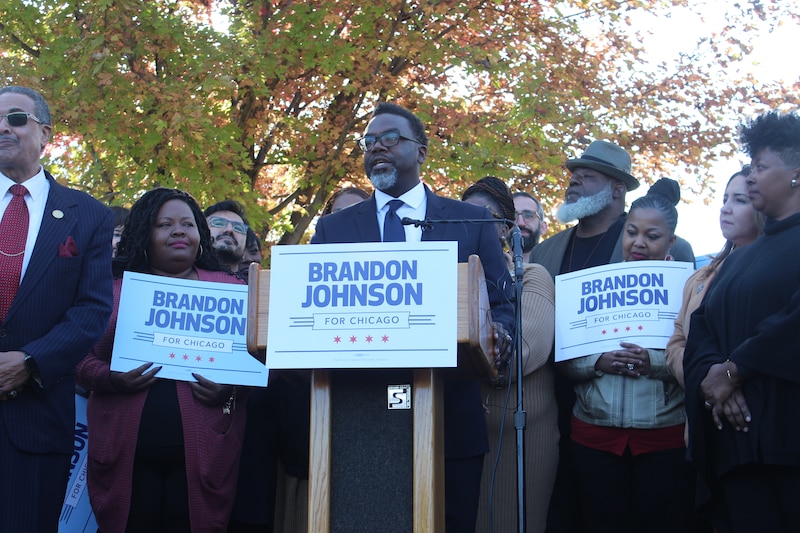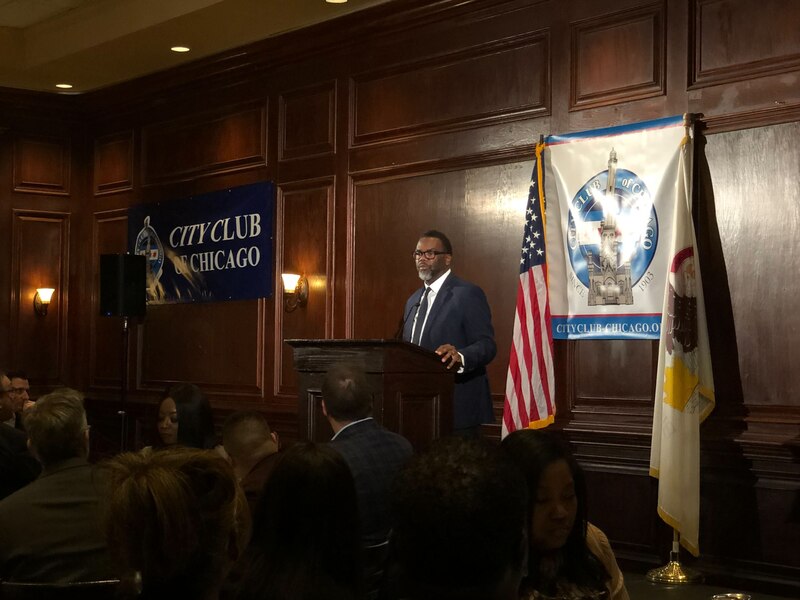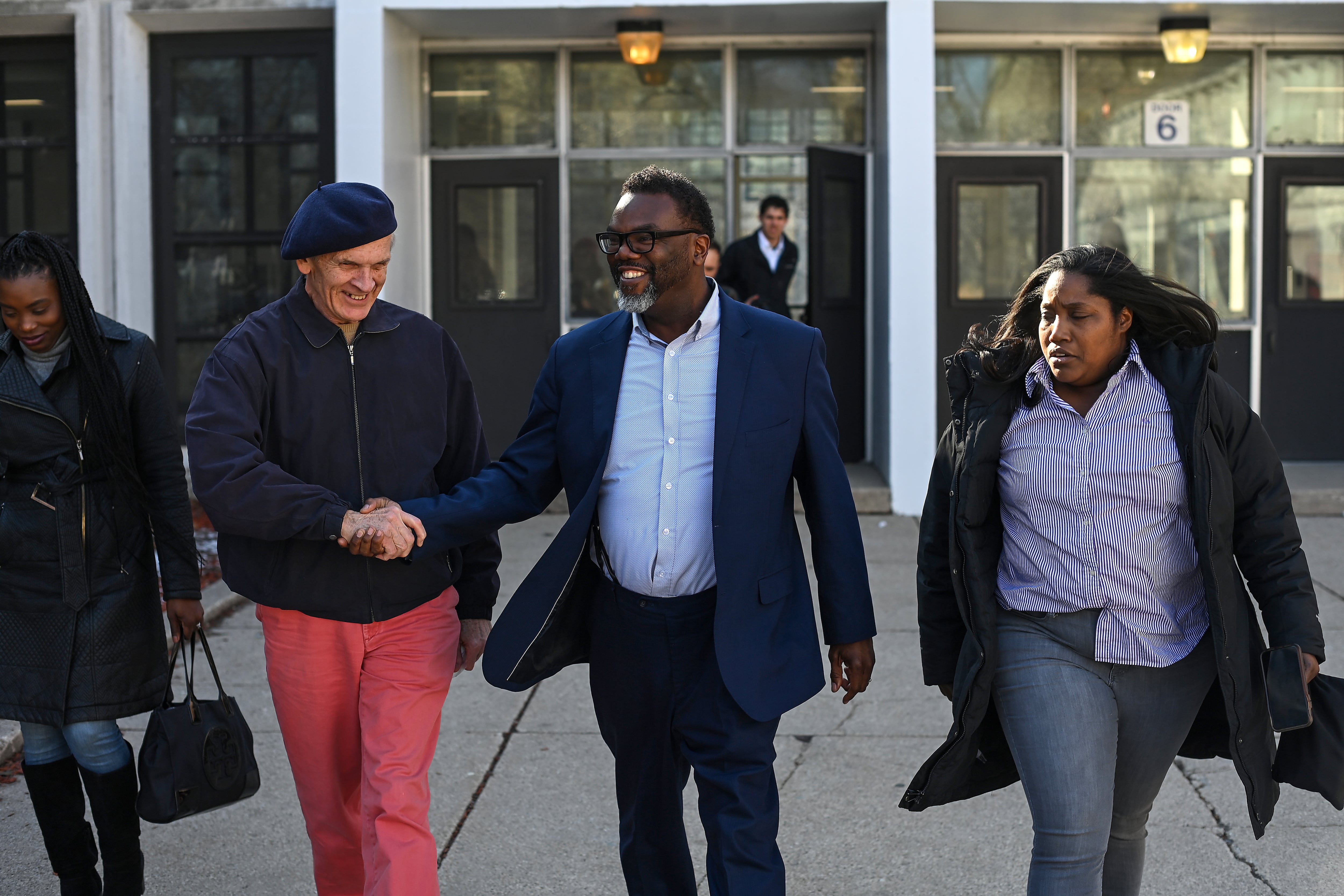Brandon Johnson has knocked on a lot of doors in the last decade.
A former rank-and-file teacher turned Chicago Teachers Union organizer, Johnson has met with thousands of teachers, pounded the pavement on behalf of dozens of candidates, and lobbied state lawmakers.
Still, he had little to no name recognition as he launched his bid to become Chicago’s next mayor.
“A few months ago, they said they didn’t know who I was,” Johnson told a crowd of supporters when he made it to the mayoral runoff election on Feb. 28. “Well, if you didn’t know, now you know.”
Although Johnson may not have been famous in Chicago politics before he ran, he didn’t come out of nowhere. Johnson is the product of a grassroots movement led by the CTU over the last decade that has focused on issues beyond the classroom, like affordable housing, public health, environmental justice, and police reform. The outcome of Johnson’s race will be an important signal about the strength of that movement.
His progressive message broke through in a field of nine candidates, and he got about 21% of the vote — enough to secure a spot in next month’s runoff election.
Now, Johnson will go head-to-head in the April 4 election with former Chicago Public Schools CEO Paul Vallas, who got about 33% of the vote in February. The two candidates have very different visions for the future of the city’s school system. The district faces challenges disentangling its finances from the city as it transitions into an elected school board, declining enrollment, and academic disparities that widened since the beginning of the COVID pandemic.
Vallas has garnered support by touting his reputation as a “fixer” who can lead in difficult times. But he has faced scrutiny on the campaign trail over his complicated history with public schools in Chicago, Philadelphia, and New Orleans.
Robert Bruno, a labor education professor at University of Illinois and longtime observer of the Chicago Teachers Union, said to some degree, Johnson’s journey from classroom teacher to political candidate came as a reaction to policies put in place by Vallas and like-minded officials.
“I think maybe Paul Vallas helped to create the conditions that made Brandon Johnson inevitable,” Bruno said.
Those conditions have prompted the CTU — and all of its organizing power — to try to put an ally into the mayor’s office before. In 2015, the union helped U.S. Rep. Jesus “Chuy” Garcia push then-Mayor Rahm Emanuel into a runoff, only to have him fall short with 44% of the vote. And in 2019, the CTU backed Cook County Board President Toni Preckwinkle, who made it to the mayoral runoff, but lost in a landslide to Mayor Lori Lightfoot.
In order to win on April 4, Johnson will likely have to more than double the number of votes he got on Feb. 28. That will be difficult, but not impossible, Bruno said.
“If he’s doing the work as an organizer, then he has to be contributing to the mobilization and the high engagement that you see, “ Bruno said. “And that might be his secret weapon.”
A middle school teacher joins a labor movement
Last fall, Johnson announced his candidacy for mayor, steps from where he taught middle school social studies. Decades earlier, Jenner Elementary Academy of the Arts served students from the nearby Cabrini-Green public housing complex. Now, it is a campus of the Ogden International School after a 2018 merger.
Tara Stamps, a former teacher who now works for the union coaching new teachers, recalled Johnson’s days at Jenner.
“He was very patient,” Stamps said. “He has a very calm demeanor. Brandon is not easily riled and you kind of need that when you’re going to be working with middle school kids.”
These qualities are important for a leader at a critical time for the city, Stamps said.
Stamps was Johnson’s mentor at Jenner and remembered advocating for him during the hiring process. He proved to be committed and connected to his students, and a necessary role model at the mostly Black school, Stamps added.
On the campaign trail, Johnson has shared his own memories of Jenner, such as the time students were displaced when the city leveled Cabrini-Green.
He’s also shared the time one of his students at Jenner told him: “You should be teaching at a good school.”
The comment caught Johnson off-guard. It also served as a call to action for him to address the lack of affordable housing, food insecurity, and gun violence — traumas that students carry into the classroom.
Along the campaign trail, Johnson has called for fully funded schools for all students and families regardless of ZIP code. “Every single child in the city” should get to have their needs met, Johnson said late last month.
After Jenner, Johnson spent about a year teaching at Westinghouse College Prep in East Garfield Park, a test-in selective enrollment high school in one of the city’s poorest neighborhoods. But then Johnson decided to start solving those problems students faced outside of schools. So in the summer of 2011, Johnson, current CTU President Stacy Davis Gates, and other educators joined an organizing initiative at the union.
They helped to get buy-in from rank-and-file members at school buildings, create partnerships with like-minded unions and community organizations, and worked to bring parents into their movement.
“Many of us became teachers to change the world,” Davis Gates said. “We wanted young people to have a good opportunity at dreaming and reimagining and transforming. And all of us have been committed to that dream as educators.”
Davis Gates said Johnson helped usher in a type of “common good” unionism that their work is about more than wages and benefits for school staff. Led by then-CTU President Karen Lewis, the union pushed a progressive agenda that focused on the broader socioeconomic challenges that affect students and families.

Johnson hit the ground running as an organizer just as the union began strengthening its political identity, Stamps said. “He was very active” organizing members in school buildings, she added.
“We were breaking ground on this new kind of unionism,” Stamps said. “[It] not only just involved its members, but brought the community in as partners in this fight for a city and a school system that Chicagoans deserved.”
In 2012, the Chicago Teachers Union carried out its first strike in 25 years. The strike, which CTU used to highlight policies members said were hurting public education, attracted international attention. It also “reshaped the educational landscape in Chicago and across the country,” Johnson said in a statement emailed to Chalkbeat Chicago.
“Karen Lewis herself said it was a battle for the soul of public education, and about protecting the most democratic institution in America,” he said.
Bruno, the University of Illinois professor, said the strike is seen as a success by labor groups, in part because of the coalition-building done by organizers like Johnson.
From being educators to knowledgeable union stewards to informed about city and state laws, organizers have a diverse set of skills, Bruno said. “They’ve got to be really good coalition builders” because they’re trying to get people to take action, he added.
Since being hired by the union, Johnson has organized CTU members at schools primarily on the South and West sides. He’s also worked with community organizations and families who reside in those neighborhoods. It’s a job he still holds today, though the union said he’s been on leave since last November.
According to the union, while on leave, Johnson earns no salary, but like other CTU staff members on leave, Johnson “is allowed to utilize his unused accrued paid time off.”
That work, which is central to Johnson’s career trajectory, has also attracted skepticism. Some observers have said Johnson would be beholden to the CTU in a way that would not be good for taxpayers. Even fellow progressives who have been supported by the CTU, like Garcia, have raised questions about those ties.
“Will Brandon, if he’s elected mayor, be able to say that he is impartial?” Garcia, who ran for mayor but failed to reach the April 4 runoff, said in an interview with the Sun-Times ahead of the Feb. 28 election.
Garcia — who as of publication has yet to throw his support behind Johnson in the runoff — went on to question whether he would make the best decision for children and taxpayers.
Johnson has promised not to raise property taxes, but has proposed a slew of new taxes, mostly targeting corporations and wealthy individuals. He has also pushed back against the criticism, saying that he is grateful for the support from working class families, and that he would be a mayor for all of Chicago.
Electoral politics become crucial to the union’s mission
To the CTU, the policies put in place by Vallas and subsequent district leaders destabilized the public school system. That perspective prompted a new frontier for the union: electoral politics.
After 50 schools closed under then-Mayor Rahm Emanuel, Lewis took those grievances to voters and made the education system’s needs clear, Davis Gates recalled.
Johnson was a key part in those political campaigns. He helped organize members and allies’ campaigns for city council in 2015 and the state legislature in 2020.
Those efforts bore fruit. In 2015, Susan Sadlowski Garza, a school counselor, became the first CTU member elected to City Council. Union ally Carlos Ramirez-Rosa also won his aldermanic race. In 2019, Rossana Rodriguez-Sanchez and other CTU allies were elected to city council seats.
And in the intervening period, Johnson decided to test his own appeal to voters. In 2018, Johnson won a seat on the Cook County Board of Commissioners, representing Chicago’s West Side and near western suburbs.
Not everyone in the union supports its focus on electoral politics. Some, for example, have said the union donated too much to candidates without a full accounting. Still, last spring, CTU’s leaders were reelected to their posts.
Johnson is the first rank-and-file member to ascend from organizer to CTU political director to mayoral runoff candidate since the union set out to get its members into elected office more than a decade ago. His rise matches Lewis’ vision of the union having political agency in every level of governance, as well as her policy priorities.
“We followed Karen’s lead and here we are today,” Davis Gates said. “We have an elected school board. We have our bargaining rights back. Our pensions are being funded.”

In his statement, Johnson said he views union organizing as key to developing a “coalition of people with interest and commission vision to bring that vision to life.”
“We have real issues in our city — the need to invest in people, the need for a public safety plan that works, the need to ensure schools are stable and predictable, and the need to grow our economy,” Johnson said.
His organizing experience, he argues, will help Chicago meet these goals.
The prospect of an organizer leading Chicago is promising to union members like Lori Torres Whitt, a 36th ward aldermanic candidate.
“I want a mayor who’s going to work with me, and make decisions for us with us,” Whitt said. “And that’s what you get with an organizer.”
Chicago High School for the Arts teacher Megan Pietz feels as though an organizer will leave the door open when it comes to making decisions.
“I feel like Paul Vallas is someone who closes that door,” Pietz said. “Being an organizer also means being willing to listen to and engage in a conversation, to engage in a discussion.”
Johnson performed well on Chicago’s Northwest and North sides, as well as some portions of the south lakefront, according to election results. But now he will have to persuade a divided electorate on the South and West sides of the city that voted for Lightfoot and Garcia.
Stamps said if anyone can do it, Johnson can.
“We earn the votes,” Stamps said. “We do the work. We out-organize and we out-work people. We knock on doors. We do the phone banks. We do the pop-ups. We do whatever is necessary to carry our message to the people. Because, ultimately, you want a people-powered campaign.”
Becky Vevea contributed to this story.
Mauricio Peña is a reporter for Chalkbeat Chicago, covering K-12 schools. Contact Mauricio at mpena@chalkbeat.org.






